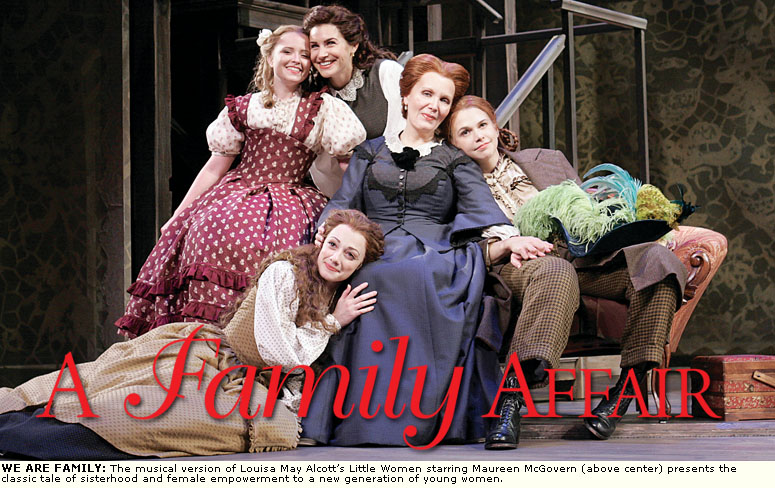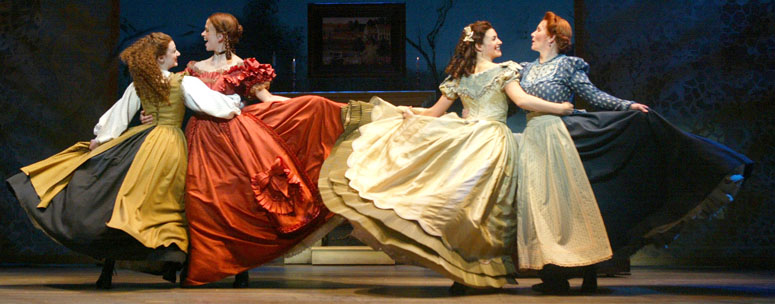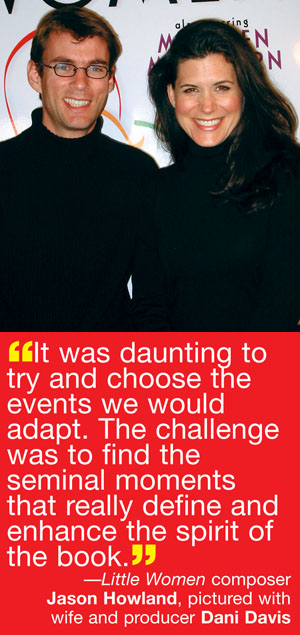
Massachusetts couple Jason Howland and Dani Davis take Louisa May Alcott's
classic novel Little Women from the literary page to the Opera House
stage by Josh B. Wardrop
If you're a believer in destiny, then it was more or less preordained that
composer Jason Howland would someday pen the songs for a Broadway musical
adaptation of Lousia May Alcott's classic novel Little Women
. Not only is Howland a native of the author's hometown of Concord, but while
he and his family resided there, according to the composer, "We actually lived
on Alcott Street."
Now, Howland and his wife Dani Davis-producer of the stage version of Little
Women and a fellow Massachusetts native-are bringing their acclaimed
musical home, with a cast spearheaded by stage/ recording star Maureen
McGovern, for a run at the Opera House through
January 22.
"It's been so exciting to bring a beautiful and powerful story like Little
Women to life," says Davis from the home she and Howland share in New
York with their two children. "Helping a classic that we both love to endure in
a new way is tremendously important to us."
Howland and Davis got involved with Little Women after playwright
Allan Knee had adapted the book (first published in 1868) into a stage play for
the children's theatre group Theatreworks USA. Knee's initial collaborations
with another musical team were ultimately fruitless, and when Howland and Davis
got wind of the project they actively sought to try their hand at it. "We
adored Allan's work, and we felt we could adapt it in a very powerful way,"
says Davis.
Researching Louisa May Alcott was a labor of love for Howland and Davis, and an
endeavor that allowed Howland to literally come home again, as the whole
creative team journeyed to Concord to visit Orchard House-the 19th century home
of the Alcott family that now serves as a museum devoted to the clan.
"Dan Turnquist (director of Orchard House) was so helpful-he made their whole
library available to us," says Davis. "And one day, they actually closed the
house just for us, and started pulling out vintage clothes and papers-things
not commonly on display-and they really let us occupy the house like the
Alcotts did. Maureen was there, and we all just had a blast."
Adapting Little Women from novel to musical provided numerous
challenges for Knee, Howland and lyricist Mindi Dickstein. "The biggest
consideration is the length of the original book," says Howland. "Everyone has
their beloved scenes and lines, which you can only honor with a 19-hour
musical. So, it was daunting to try and choose the events we would adapt. The
challenge was to find the seminal moments that really define and enhance the
spirit of the book."

When it comes to the music of Little Women , Howland says that he was
guided by the classic composers of the genre-Richard Rodgers, Irving Berlin,
Stephen Sondheim and others. "The novel is a classic, so we felt we should
score the piece like a classic musical," says Howland. "To write some sort of
modern pop score would have been a disaster-that wasn't the world these
characters lived in."
Having said that, however, it was also important to Howland to capture "the
extremely powerful proto-feminist" that Alcott was. And, to that end, Howland
said that a conscious effort was made to ensure that "all the songs that
Jo-essentially, our representation of Louisa May Alcott-sings have a more
contemporary feel to them."
 In addition to bringing the characters of Little Women
to life, Howland and Davis felt that they had a responsibility to pay tribute
to Alcott herself and the importance her feminist ideals had to women of her
time and beyond. "She was a forward thinker about everything," says Howland.
"And Little Women really contains undercurrents of what it meant to be
a woman in the 1800s-how you managed to fit into the stereotypes [held about
the fairer sex] when you were a brilliant person in your own right."
In addition to bringing the characters of Little Women
to life, Howland and Davis felt that they had a responsibility to pay tribute
to Alcott herself and the importance her feminist ideals had to women of her
time and beyond. "She was a forward thinker about everything," says Howland.
"And Little Women really contains undercurrents of what it meant to be
a woman in the 1800s-how you managed to fit into the stereotypes [held about
the fairer sex] when you were a brilliant person in your own right."
To that end, Davis says the character of Jo March (always more or less a
literary personification of Alcott to begin with) was given some scenes that
directly echoed events in Alcott's life-such as a scene which opens Act II and
sees Jo acting out one of her "potboiler" plays for a potential publisher.
"Louisa May would perform these plays in parlors in order to raise money for
the Massachusetts 54th Regiment during the Civil War," says Davis. "We had a
blast delving into the personal histories of the Alcott family for the
musical."
For Davis, one of the most exciting aspects of bringing Little Women to
life as a musical was a chance to expose Alcott's legendary tale of sisterhood
and female empowerment to a new generation of girls. "Louisa May Alcott
herself, and her characters, were just great role models for young woman," says
Davis, adding that she's heard from young girls who've been motivated to start
writing fiction and get involved with drama after viewing Little Women
the musical.
"I think that the 'tweens' of today are incredibly impressionable, but also
believe in their own potential," adds Davis. "And if you provide good role
models, instead of just images of T&A, the girls of today get inspired by
that."
Despite the couple's tremendous success on and off Broadway, both agree that
nothing can compare to the excitement of bringing such a deeply personal
project to the region that influenced them, and it, so profoundly. "Little
Women really belongs in Boston-it's coming home as we are," says
Davis. "We can't wait to present this to family and friends, and we really hope
that it speaks to people from Massachusetts the way it has to us." 
back to homepage
Little Women plays the Opera House through January 22. Refer to
listing.